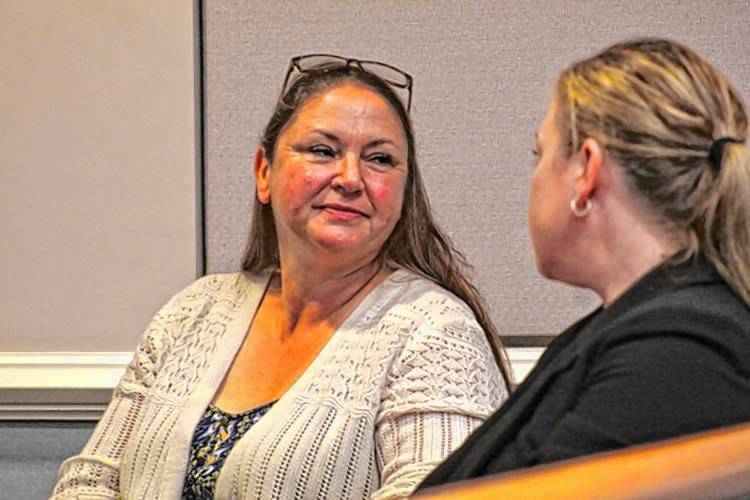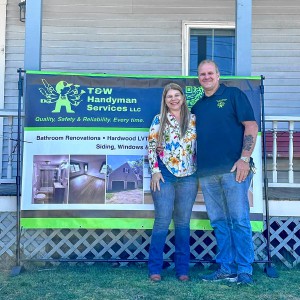Court lifts stay order on Silver Scone Teas

Jane Elwell, owner of Silver Scone Teas, speaks with one of her representatives during a court hearing in August. —FILE PHOTO BY ASHLEY SAARI
|
Published: 03-11-2024 8:31 AM
Modified: 03-15-2024 10:57 AM |
Hillsborough Superior Court, South, has lifted a previously imposed stay on the Silver Scone Teas tea party event business in New Ipswich, which has been embroiled in appeals of approvals to operate in the town’s Village District.
Silver Scone Teas is run by Jane Elwell out of her historic home on River Road. Elwell was initially operating without gaining the needed approvals from the town planning and zoning boards. After receiving a cease-and-desist order from the town in June 2022, she began the processes for the needed site plan approval and variances, both of which were granted with conditions. The boards have approved events to happen up to four days per month.
Neighbors who object to the business have appealed decisions made by the Planning Board, Zoning Board and Select Board, going to the state Housing Board of Appeals and Superior Court after exhausting appeals at the local level.
Previously, the Superior Court had issued a stay on the business, effectively stopping any action related to Elwell’s business while legal proceedings were underway. In a decision issued by Judge Charles S. Temple on Wednesday, that stay was lifted.
According to Temple’s decision, during a Dec. 21 hearing on a motion filed by Elwell to lift the stay, Elwell argued she needed the stay lifted to complete the conditions set by the town before the boards could officially sign off on her plans.
Temple noted in his decision that there are two kinds of conditions that a board can attach to an approval – that must be complied with before the approval can become final (conditions precedent), and those those that can be completed after final approval (conditions subsequent).
Precedent conditions include those that must be fulfilled before a building may be built, such as obtaining easements, while subsequent conditions might be restrictions on the use of a property such as hours of operation. Temple said it is not clear whether any of the 17 conditions attached to Elwell’s approval are precedent, with the board’s decision stating only, “With the conditions noted, the Planning Board voted to approve the site plan application.”
Temple determined that if any of the conditions were precedent, the board’s approval of Elwell’s site plan would not yet be final, and thus, not able to be appealed. He noted that some conditions, such as resolving a Department of Environmental Services (DES) wetland crossing complaint and resolving potential turtle sightings with DES or New Hampshire Fish and Game, and minor alterations ordered to be made to the proposed site plan, could be precedent conditions, but the board made no distinction in its decision.
Article continues after...
Yesterday's Most Read Articles
Temple noted in a footnote to the decision that Elwell and the neighbors had, at one point, agreed that the Planning Board chair had yet to officially sign off on final site plan review approval, as of Dec. 7 filings, making the decision not yet final. Prior to the hearing, neighbors filed an objection in which they took the position that the Planning Board’s decision on approving Elwell’s plan was “not yet final,” due to unfilled conditions. However, during the hearing on Dec. 21, neighbors alleged that the decision was not a conditional approval, but rather a final approval, and could be appealed.
“The plaintiffs were unable to coherently explain why they had completely changed their opinion about the finality of the board’s approval over the course of just 10 days. As a result, it appears that the plaintiffs reversed their legal position to simply meet the exigencies of the moment, a practice which the court condemns,” Temple wrote in his footnote to the decision.
In another footnote, Temple “strongly urged” the Planning Board to specify whether conditions it imposes are precedent that must be satisfied prior to final approval in future applications.
Without the clarity needed, Temple remanded the issue to the Planning Board, using a “cautious approach” to the matter. The court ordered the board to determined and clearly delineate which, if any, of the conditions of approval are precedent and which are subsequent.
If all conditions are considered subsequent, the court determined the decision to be final and able to be appealed, though Temple directed a new appeal should be filed with the court at that point. If any of the conditions are considered precedent to final approval, the Planning Board shall retain jurisdiction over the application to determine whether Elwell has satisfied all conditions, at which point the decision would then become final and able to be appealed.
Ashley Saari can be reached at 603-924-7172, Ext. 244, or asaari@ledgertranscript.com. She’s on X @AshleySaariMLT.

 The Greenfield Beat: Jesseca Timmons – Diana Dunbar Place focuses on life’s ‘third act’
The Greenfield Beat: Jesseca Timmons – Diana Dunbar Place focuses on life’s ‘third act’ T & W Handyman Services in Jaffrey celebrates new location
T & W Handyman Services in Jaffrey celebrates new location BACKYARD NATURALIST: Phil Brown – Kestrel conservation expands in the Contoocook Valley
BACKYARD NATURALIST: Phil Brown – Kestrel conservation expands in the Contoocook Valley
